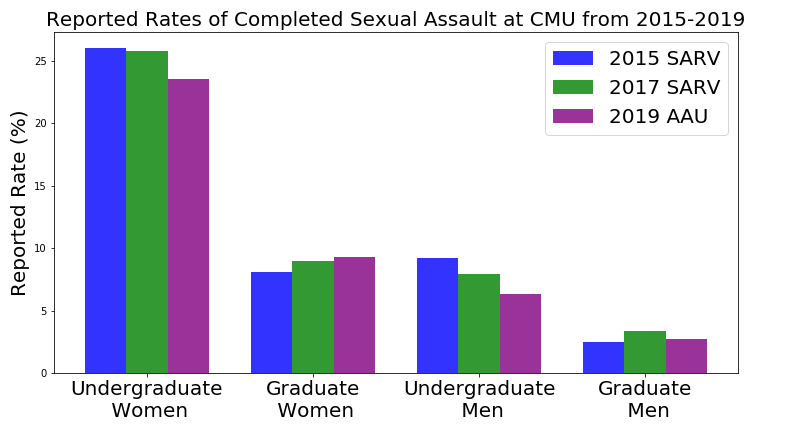
It Happens Here: Reflections on the AAU 2019 Survey on Sexual Assault and Misconduct
By the GSA Executive Committee
Two weeks ago, the Association of American Universities (AAU) released a report on campus sexual violence at 33 major research universities across the country, including Carnegie Mellon. The report, summarizing findings based on responses from more than 180,000 students at these universities, paints a harrowing picture of some students’ experiences as they pursue their education. Especially worrying is that rates of harassment and assault against Carnegie Mellon graduate students have not decreased over the past four years, despite increased campus dialogue around sexual violence and misconduct. For example, the number of graduate women that reported experiencing sexual assault was 8.1% in 2015, 9.0% in 2017, and 9.3% in 2019. In light of these findings, we must improve not only how we respond to such incidents, but also how we ensure that they don’t happen in the first place.
Sexual violence is unacceptable in any context. In the aggregate, we observe that graduate and undergraduate students differ in the environments where they are most vulnerable. For instance, reflecting their more frequent interactions with faculty and their greater dependence on the approval of one or a few faculty, graduate students experiencing harassment are more likely than undergraduates to have been harassed by faculty members (11.5-15.0% and 2.7-6.4%, respectively). Recognizing the particular vulnerability of working with the same supervisors, postdoctoral associates, and student coworkers for years at a time, it is essential to expand mandatory Title IX training for faculty and establish mandatory sexual harassment and misconduct training that clearly lays out unacceptable student, faculty, and staff behaviors in the context of power imbalances. We are also advocating for the university to conduct mandatory advising surveys, like the one GSA conducted in 2017, to take a deeper look into and better understand advisor-advisee relationships and mentorship practices at CMU.
We also see that undergraduates are far more likely to have experienced sexual assault or rape during their time at CMU (23.5% of undergraduate women reported nonconsensual sexual contact, versus 9.3% of graduate women). Likely because of this discrepancy, there is a higher emphasis on consensual relationships and Title IX training for undergraduate students than for graduate students. Lower rates do not mean graduate students merit any less attention: every assault is condemnable, and we must push forward the work to eliminate campus sexual violence. Hence, we will advocate for increased resources to provide regular Title IX and bystander intervention training for graduate students, faculty, and staff.
One of the most alarming differences between the graduate and undergraduate populations is the difference in knowledge of resources available. Approximately 38% of graduate students are aware of the TItle IX office as a resource, as opposed to 82% of undergraduate students. Graduate students also have lower awareness of how CMU defines sexual assault or misconduct. Here, we are going to improve our efforts to effectively communicate the resources available to graduate students, both in terms of prevention and response. In the coming weeks, we will continue working with the Title IX office, as well as other offices at CMU, to develop an action plan.
While there are many areas where we can see a path forward, there is still a lot to understand. For example, of those who experienced sexual assault or misconduct and did not report the incident(s), there is wide variation between graduate and undergraduate students for why they did not file a report. We have focused here on the responses about nonconsensual sexual contact and harassment, but there is even more about intimate personal violence and stalking that we must address. In addition, there are significantly different rates of sexual violence experienced across demographics like racial, ethnic, and gender identities. We plan to examine these aspects in detail moving forward, and to advocate for change on our own campus, as well as the local, state, and national level. If you would like to be involved on this topic through the GSA, we encourage you to join one of our committees by emailing our VP of Campus Affairs for CMU-specific action or our VP of External Affairs for action at the local, state, and federal level.
If you have experienced sexual assault or misconduct, there are a number of ways to reach out. You can file a report through the Title IX Office at CMU or anonymously through the Ethics Reporting Hotline by calling 877-700-7050 or visiting www.reportit.net (user name: tartans; password: plaid). The hotline is NOT an emergency service; for an on-campus emergency you should contact University Police at 412-268-2323, and if you are off-campus dial 911. You can see how a report is handled by the University here. All CMU students at the Pittsburgh campus can also access free counseling sessions at the Counseling and Psychological Services (CaPS).